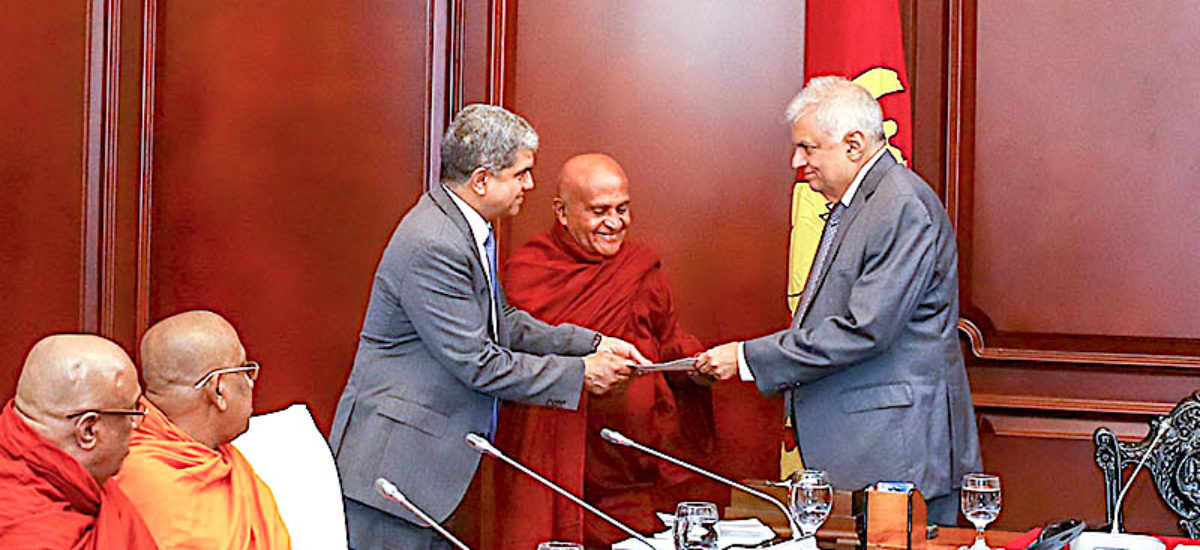Photo courtesy of Colombo Gazette
The last few weeks witnessed a flurry of activity that brought to light a quiet initiative which has been progressing during the past year in terms of the post-war reconciliation process in the country. For close upon 15 years, after the end of the fighting in 2009, neither the effects nor the causes of the conflict have been adequately dealt with or addressed. Regarding the effects of the war, we still have detainees under the Prevention of Terrorism Act (PTA) who continue to be detained and private and communal land occupied by the military that has yet to be released. No effective remedies have been provided for the multiple vulnerabilities of the large number of widows and women headed households in the Vanni. The political issues underlying our long drawn out civil war and associated bouts of politically motivated communal violence was best described by former MP and suicide bomb victim Dr. Neelan Tiruchelvam when he termed it “the anomaly of imposing a mono-ethnic state on a multiethnic society”.
The Ranil Wickremesinghe administration has accepted that the process of national reconciliation needs to be moved forward and towards this end, during its one year in office, has been talking about both the full implementation of the 13th amendment to the constitution and the establishment of a truth and reconciliation commission. As part of addressing the bankrupt national finances, the Wickremesinghe administration committed itself to the process of demilitarization, demobilization and reintegration (DDR), a normal process of right sizing a post war military to its peace keeping rather than war fighting strength. The DDR process has not occurred in Sri Lanka. With 1.5% of the population in active military service, Sri Lanka is South Asia’s most militarized society with a defense budget that is greater now than it was any time during our war and much more than either our education or health budgets.
In this context a group of Maha Sanga from various nikayas, styled as the Sanga for Better Sri Lanka (SBSL), have come together and quietly resolved to take the initiative and seek to be a catalyst and move forward a process of national reconciliation. Towards this end they discretely commenced a dialogue process with the Tamil diaspora groups coming under the umbrella of the Global Tamil Forum (GTF), the largest, most influential and visible of the Tamil diaspora organizations around the world. The structured dialogue included intense discussions in Nepal and culminated in the Himalayan Declaration, a statement of principals to be used in a national conversation within Sri Lanka. The intent of the national conversation is to explore the ways and means to create a country where every citizen can live peacefully with dignity, trust and no fear or suspicion, enjoying equal rights.
Their structured dialogue produced a common statement that “lack of understanding and the fear of the other” were fundamental factors in undermining the ethnic and religious harmony in the country. The dialogue revealed that “the Sinhala Buddhist community feared about preserving their historic and unique identity and pride of place in the (only) country they inhabit from the many forces they view as antagonistic, which include minority communities and the Tamil Diaspora. On the other hand, the emotions and politics of the Tamil people were always driven by a mirroring fear – losing their defining identity and viable existence in areas they have been inhabiting for long periods of history through calculated state measures”. The Himalayan declaration flowing from this dialogue and understanding reached provide a set of guiding principles, which seeks to ensure equality and equal citizenship for all peoples, promotes the pluralistic character of Sri Lanka and calls for respecting the different ethnic, religious and cultural identities while strengthening trust and promoting responsive and accountable public governance.
In pursuit of these ideals and goals, the SBSL and the Global Tamil Forum GTF, as twin delegations, traveled across Sri Lanka meeting religious dignitaries and political leaders, presenting the declaration and explaining the thinking behind it. They were had meetings with the Maha Nayakas of the Malwatta and Asgiriya Chapters and the Chairman of the Catholic Bishops Conference as well as Cardinal Malcom Ranjith, the All Ceylon Jammiyathul Ulama (ACJU), the Mosques Federation and the Maikundal Swami Kurukkal of the Nallur Temple Jaffna. The twin delegations also met President Ranil Wickremesinghe, former presidents Mahinda Rajapaksa, Maithripala Sirisena and Chandrika Bandaranaike Kumaratunga, the speaker of parliament and the leader of the opposition.
The initiative by the Maha Sanga of the SBSL in cooperation with the Tamil diaspora structured in the GTF and their joint Himalayan Declaration and the commencement of the national conversation was well received by all the religious and political leaders. It was noteworthy that none of the spiritual (religious) nor temporal (political) leaders the delegations met were negative about the initiative and, on the contrary, all wished it well.
The task before the SBSL and the GTF is huge. They require a national conversation or dialogue process like the Sudu Nelum movement of President Chandrika Kumaratunga thirty years ago. But she launched Sudu Nelum as president and with the full backing of the state. The SBSL and the GTF would have to do a near similar exercise with the just the hope, goodwill and aspirations of a nation to guide and enable them.

